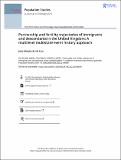Files in this item
Partnership and fertility trajectories of immigrants and their descendants in the United Kingdom : a multilevel multistate event history approach
Item metadata
| dc.contributor.author | Mikolai, Julia | |
| dc.contributor.author | Kulu, Hill | |
| dc.date.accessioned | 2022-11-28T18:30:06Z | |
| dc.date.available | 2022-11-28T18:30:06Z | |
| dc.date.issued | 2023-09-01 | |
| dc.identifier | 280558881 | |
| dc.identifier | 8013615d-8138-4329-b539-48016c1aa5da | |
| dc.identifier | 85142299334 | |
| dc.identifier | 000888940100001 | |
| dc.identifier.citation | Mikolai , J & Kulu , H 2023 , ' Partnership and fertility trajectories of immigrants and their descendants in the United Kingdom : a multilevel multistate event history approach ' , Population Studies , vol. 77 , no. 3 , pp. 359-378 . https://doi.org/10.1080/00324728.2022.2144639 | en |
| dc.identifier.issn | 0032-4728 | |
| dc.identifier.other | ORCID: /0000-0002-7733-6659/work/123613991 | |
| dc.identifier.other | ORCID: /0000-0001-8808-0719/work/123614108 | |
| dc.identifier.uri | https://hdl.handle.net/10023/26511 | |
| dc.description | Funding: This project has received funding from the European Research Council (ERC) under the European Union’s Horizon 2020 research and innovation programme (grant agreement No 834103). | en |
| dc.description.abstract | We study the interrelationships between partnership and fertility trajectories of immigrant women and female descendants of immigrants using the UK Household Longitudinal Study. We propose a novel multistate event history approach to analyse the outcomes of unpartnered, cohabiting, and married women. We find that the partnership and fertility behaviours of immigrants and descendants from European and Western countries are similar to those of native women: many cohabit first and then have children and/or marry. Those from countries with conservative family behaviours (e.g. South Asian countries) marry first and then have children. Women from the Caribbean show the weakest link between partnership changes and fertility: some have births outside unions; some form a union and have children thereafter. Family patterns have remained relatively stable across migrant generations and birth cohorts, although marriage is being postponed in all groups. Our findings on immigrants support the socialization hypothesis, whereas those on descendants are in line with the minority subculture hypothesis. | |
| dc.format.extent | 20 | |
| dc.format.extent | 1687711 | |
| dc.language.iso | eng | |
| dc.relation.ispartof | Population Studies | en |
| dc.subject | Fertility | en |
| dc.subject | Partnerships | en |
| dc.subject | Multistate event history analysis | en |
| dc.subject | Immigrants | en |
| dc.subject | Descendants | en |
| dc.subject | United Kingdom | en |
| dc.subject | GF Human ecology. Anthropogeography | en |
| dc.subject | 3rd-DAS | en |
| dc.subject | MCC | en |
| dc.subject.lcc | GF | en |
| dc.title | Partnership and fertility trajectories of immigrants and their descendants in the United Kingdom : a multilevel multistate event history approach | en |
| dc.type | Journal article | en |
| dc.contributor.sponsor | European Research Council | en |
| dc.contributor.institution | University of St Andrews. Geographies of Sustainability, Society, Inequalities and Possibilities | en |
| dc.contributor.institution | University of St Andrews. Population and Health Research | en |
| dc.contributor.institution | University of St Andrews. School of Geography & Sustainable Development | en |
| dc.contributor.institution | University of St Andrews. Sir James Mackenzie Institute for Early Diagnosis | en |
| dc.identifier.doi | 10.1080/00324728.2022.2144639 | |
| dc.description.status | Peer reviewed | en |
| dc.identifier.grantnumber | 834103 | en |
This item appears in the following Collection(s)
Items in the St Andrews Research Repository are protected by copyright, with all rights reserved, unless otherwise indicated.

